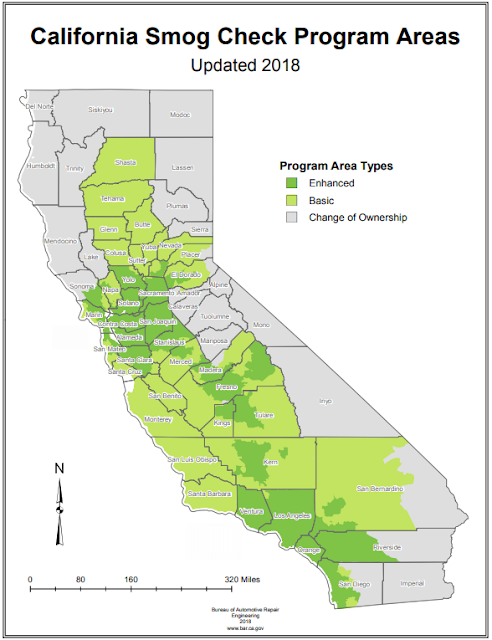The state of California has a unique relationship with emissions standards. For the rest of the nation, states follow the national emissions standards set and regulated by the Environmental Protection Agency. California has its own emissions standards which are by and large much more stringent than the rest of the country.
Why the high standards?
There are more that 24 million passenger cars registered in California, according to the California Air Resources Board. California far outnumbers all other states in automobile registration, with Texas a distant second at just over 8 million. This can have outsized affects on air quality, with the American Lung Association giving many counties in the state of California an “F” for air quality grade.
With this data in mind, it can be argued that California has a greater need for strict emissions standards than other states. So what are these standards and who needs to comply?
Smog Check Program Areas
California is divided into 3 zones based on air quality which determines how often smog checks are required for vehicles.

Change of Ownership Areas
Most rural areas of the state are less densely populated and, as a result, have higher air quality. If your vehicle is registered in this area, a smog check is only required when the vehicle changes ownership, unless that car is less than 4 years old in which case smog is not required.
Basic Areas
Though not as egregious as the next category, basic areas of the state are determined to have marginal air quality and thus require biennial (every two years) smog checks.
Enhanced Areas
These areas meet neither the state nor federal air quality standards for carbon monoxide or ozone. Not only are biennial smog checks required, but also certain vehicles must have their vehicles checked at STAR stations, which test for higher performance standards.
If you are not sure what area you fall into, the DMV provides a handy area code search option for your convenience. Your registration notice should also provide you information about when a smog check is required for renewal.
There are a few vehicles that are exempt from smog altogether, regardless of the zone you live in. Smog checks are not required for
· Diesel vehicles from 1997 and older
· Gasoline powered vehicles from 1975 and older
· Electric vehicles
· Motorcycles
What if my vehicle doesn’t pass smog?
If your vehicle does not meet the emissions standards for your area, it will not pass a smog test. You would have two options in this type of situation: repair the vehicle or retire it.
The California Bureau of Automotive Repair is the institution tasked with assisting in these situations. Their Referee Program helps verify the emissions standards for your vehicle. If the referee certification fails, they will provide you with a Vehicle Compliance Checklist that you can bring to your automotive technician for review so that the needed repairs can be made.
The website for the Referee Program also include some common reasons a vehicle may not pass a smog check:
· If the vehicle has been modified with non-approved aftermarket parts
· If the vehicle needs emissions-related repairs
· A faulty oxygen sensor or other type of sensor
· High HC, CO & NOX levels
· Vacuum leaks
Vehicle repairs can be expensive, and a tight timeline does not help if your registration renewal is coming up. The Bureau of Automotive Repair has resources available for qualifying individuals. It’s Consumer Assistance Program helps finance repairs for those who meet the income requirements. If the vehicle is beyond repair, you can also look into CAP’s vehicle retirement option, which provides eligible consumers with $1,000-1,5000 for retiring their vehicles to an authorized dismantler site.
Other Consequences of Failing Emissions Standards
Quite a few violations can result from a failure to meet emissions standards. For example, the DMV will accept registration renewal payments even if a smog check is required, but renewed registration and registration stickers will not be issued until they have received the needed smog information. If you are pulled over and an officer discovers your registration is incomplete, you could be issued a citation for CVC § 4000.
Modifying your vehicle with aftermarket parts can also affect emissions and noise levels and lead to a violation of CVC § 27150.
If you received citations for either of these vehicle codes, reach out to our team to learn more about your options to address the tickets.
However, it is always best to be proactive rather than wait to see if you receive a citation. A cleaner California is all of our responsibility, so ensure you are keeping up-to-date with your vehicle’s emissions along with your areas smog regulations.




